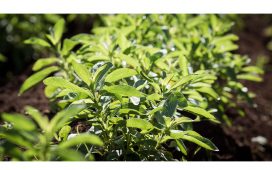PHILADELPHIA — Kelp plays a key role in the future of food as a sustainable, nutritious ingredient popping up in a range of applications, according to panelists who discussed the possibilities of regeneratively farmed sea greens during an education session at Natural Products Expo East on Sept. 30 at the Pennsylvania Convention Center.
“Kelp is one of the most nutrient-dense foods on the planet,” said Briana Warner, founder and chief executive officer of Atlantic Sea Farms, Biddeford, Maine. “It’s full of magnesium, calcium, potassium and iodine.”
A “virtuous vegetable,” kelp requires no arable land, irrigation or pesticides or herbicides, while filtering excess carbon and nitrogen from the water, according to Atlantic Sea Farms, which partners with local lobster fishermen to grow and harvest kelp with the goal to diversify coastal incomes and reduce ocean acidification. In four seasons since its first harvest, the company’s farms have removed more than 260,000 lbs of carbon from Maine waters.
“Last year we grew 85% of the line-grown seaweed in the United States, and it was all grown by fisherman on small farms throughout the coast of Maine,” Ms. Warner said. “We now have the volume where we are able to not only supply our own consumer products … but also have the ability to provide this as an ingredient for other products so that we can continue to amplify our impact well beyond our own brand.”
Atlantic Sea Farms is launching two plant-based burgers formulated with kelp and green chickpeas, plus pea protein, oat fiber, chickpea flour and nutritional yeast. Flavors include ginger sesame and basil pesto. The company also recently partnered with The Plant Based Seafood Co., Gwynn’s Island, Va., which will begin incorporating its kelp into a line of vegan takes on crab cakes, shrimp and scallops. The products are rolling out to Sprouts Farmers Market stores in the coming months.
“We create healthy and delicious seafood experiences that just so happen to be made from plants so close to the real thing that they will blow your mind, with a mission to relieve the pressure and burden that’s currently on our oceans with a vision of leaving our children with a vibrant beautiful planet,” said Monica Talbert, co-founder and CEO of The Plant Based Seafood Co. “Kelp is a no-brainer.”
Blue Dot Kitchen, Seattle, formulates the seaweed in a range of crunchy, puffed snacks. Available in salt and pepper, spicy and umami flavors, Seacharrones are made with organic ingredients, including kelp, sorghum and spirulina.
“With our product, we leaned into the positive attributes of seaweed,” said Travis Bettinson, CEO and director of research and development at Blue Dot Kitchen. “We leaned into the wonderful traceability, the nutrition, the environmental impacts of US grown seaweed… We wanted the customers to know they’re eating kelp because part of that long-term education for those who are on the fence is understanding that you’re eating it.”
Sea and Flour, Philadelphia, is set to launch bread and buns baked with kelp. The product line was developed to address climate change, reduce the risk of hypertension and osteoporosis and expand regenerative agriculture.
“We want a lot of people to eat seaweed really often,” said Arlin Wasserman, co-founder and CEO.
Kelp also has applications in the pet food category, said Tasha Valentin-Jucius, education experience specialist at Earth Animal, Southport, Conn. The company offers dog treats based on kelp sourced from Atlantic Sea Farms.
Product developers may encounter challenges formulating with kelp. Navigating a nascent supply chain is one.
“People need to work with kelp providers a little bit differently because it’s so new and we really do kind of jump through every hurdle,” Ms. Warner said. “There was no domestic supply of line-grown seaweed three years ago.”
Cost is another issue.
“We don’t want the price to be a barrier to try our products, but we want these really incredible high-quality ingredients to have a story to tell that consumers are excited about,” Ms. Talbert said. “I think that only happens with getting more kelp out there and bringing down the cost through efficiencies of scale.”






